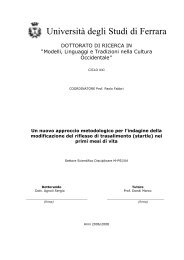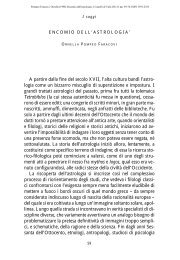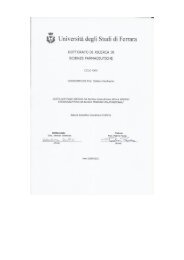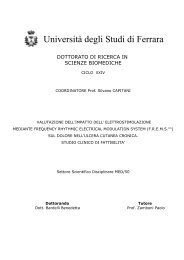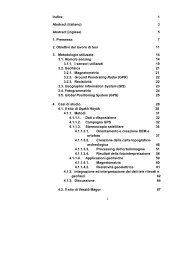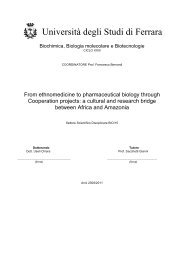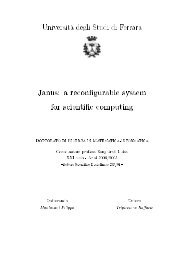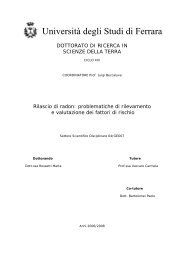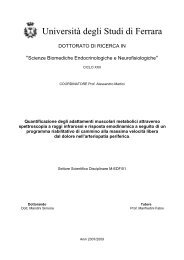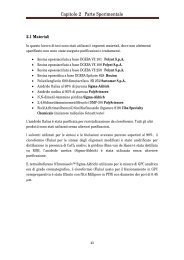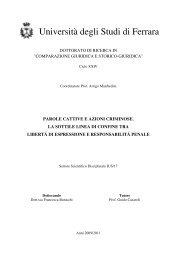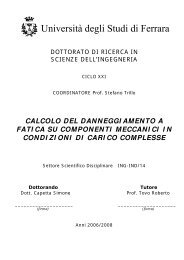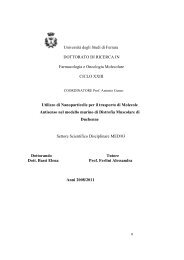- Page 1 and 2:
Contents1.
- Page 3 and 4:
linearity and compatibility conditi
- Page 5 and 6:
5and since g ◦ f is an epimorphis
- Page 7 and 8:
Proof. Clearly (qP )◦(αP ) = (qP
- Page 9 and 10:
Lemma 2.13 ([BM, L
- Page 11 and 12:
i.e. Hom B (Y, iX) equalizes Hom B
- Page 13 and 14:
13such thatd 0 ◦ v = Id Yd 1 ◦
- Page 15 and 16:
f ↦→ Rfis bijective for every X
- Page 17 and 18:
Remark 3.10. Let A = (A, m A , u A
- Page 19 and 20:
19and fromµ A P ◦ ( µ A P A ) =
- Page 21 and 22:
and thusk ◦ (u A QZ) ◦ (Qz) = h
- Page 23 and 24:
and since A preserves equalizers, A
- Page 25 and 26:
Conversely, let Φ be a functorial
- Page 27 and 28:
Proof. Apply Proposition 3.24 to th
- Page 29 and 30:
Since Q is a left A-module functor,
- Page 31 and 32:
(Q BB F, p QB F ) = Coequ Fun(µBQ
- Page 33 and 34:
Theorem 3.37. Let B = (B, m B , u B
- Page 35 and 36:
where A UG B F : B → A is such th
- Page 37 and 38:
Proposition 3.44. Let A = (A, m A ,
- Page 39 and 40:
Note that, since f and g are A-bili
- Page 41 and 42:
Proposition 3.54. Let (L, R) be an
- Page 43 and 44:
Corollary 3.58. Let (L, R) be an ad
- Page 45 and 46:
Definition 4.2. A
- Page 47 and 48:
Proposition 4.13. Let C = ( C, ∆
- Page 49 and 50:
Then we have(P Cx) ◦ ( ρ C P X )
- Page 51 and 52:
and since C preserves coequalizers,
- Page 53 and 54:
Proof. Apply Corollary 4.24 to the
- Page 55 and 56:
Let( (CQ ) ()D, ι Q) C = Equ Fun
- Page 58 and 59:
58F D right D-comodule functors Q :
- Page 60 and 61:
60prove that C ν D : C F D → (C
- Page 62 and 63:
624.2. The compari
- Page 64 and 65:
64and[(Ω ◦ Γ) (ϕ)] (Y ) = (LY,
- Page 66 and 67:
66for every ( X, C ρ X)∈ C A, th
- Page 68 and 69:
68i.e.(44) (d ϕ K ϕ Y ) ◦ (̂η
- Page 70 and 71:
70In particular(49) d ϕ(CX, ∆ C
- Page 72 and 73:
72We have to prove that (LD ϕ , Ld
- Page 74 and 75:
74we have that Ld ϕ K ϕ Y is mono
- Page 76 and 77:
and since d is mono we get that(ε
- Page 78 and 79:
78Corollary 4.63 (Beck’s Precise
- Page 80 and 81:
80We compute(LRɛLY ′ ) ◦ ( LR
- Page 82 and 83:
82Proof. First of all we prove that
- Page 84 and 85:
84i.e. Aα is a functorial morphism
- Page 86 and 87:
86Then we haveA µ CCX ◦ ( A∆ C
- Page 88 and 89:
884.23) is a functor à : C A → C
- Page 90 and 91:
90Let θ l = ( σ B P Q ) ◦ (P τ
- Page 92 and 93:
925)σ A = ( ε C A ) ◦ ( Cσ A)
- Page 94 and 95:
94(ii) the functorial morphism can
- Page 96 and 97:
96defΦ= ( QP A µ Q)◦(QP σ A Q
- Page 98 and 99:
98AU A can AA F = can AA F = ( CσA
- Page 100 and 101:
100Similarly, one can prove the sta
- Page 102 and 103:
102(b) A comonad C = ( C, ∆ C ,
- Page 104 and 105:
104We calculateso that we getx ◦
- Page 106 and 107:
106There exist functorial morphisms
- Page 108 and 109:
108andsatisfying(B, y) = Coequ Fun(
- Page 110 and 111:
1104) With notations of Theorem 6.2
- Page 112 and 113:
112Then ν : Y → D is the unique
- Page 114 and 115:
114= A µ Q ◦ ( Aε C Q ) ◦ (AC
- Page 116 and 117:
116= ( Aε C Q ) ◦ ( cocan1 −1
- Page 118 and 119:
118so that we getχ= (Cx) ◦ (C ρ
- Page 120 and 121:
120We want to prove that Γ is an o
- Page 122 and 123:
122and since Dε D is an epimorphis
- Page 124 and 125:
124χ= (Cχ) ◦ (C ρ Q P Q ) ◦
- Page 126 and 127:
126Now, since cocan 1 : AC → QP i
- Page 128 and 129:
1287. Herds and Coherds7.1.
- Page 130 and 131:
130◦ ( σ A QQQ ) ◦ (A µ Q P Q
- Page 132 and 133:
132= µ B Q ◦ (A µ Q B ) ◦ ( A
- Page 134 and 135:
134Assume now that there is another
- Page 136 and 137:
136and hence we get(160) x ◦ (χP
- Page 138 and 139:
138Proposition 7.7. In the setting
- Page 140 and 141:
140We calculateA µ Q ◦ ( σ A Q
- Page 142 and 143:
142x=and=δ C=(l= QlQ ̂QQ)◦ (QP
- Page 144 and 145:
144(◦ ρ D ̂QQ)Q◦ (QlQ) ◦ (Q
- Page 146 and 147:
146given byWe computeσ B = m B ◦
- Page 148 and 149:
148andy= ′m B ◦ (ν B B) ◦ (y
- Page 150 and 151:
150Now we compute(hQ) ◦ ( Qχ )
- Page 152 and 153:
152Thus we obtainσ B ◦ ( ) (P µ
- Page 154 and 155:
154Thus hQ is an isomorphism with i
- Page 156 and 157:
156) ( )l=(pb Q AQ B ◦ ̂QA µ QB
- Page 158 and 159:
158In fact we haveTherefore we dedu
- Page 160 and 161:
160χ= h 1 ◦ (P xQ B ) ◦ (P QP
- Page 162 and 163:
162so that we obtain:(190)We comput
- Page 164 and 165:
164(194)=) )(p QB ̂QA ◦(Qpb Q◦
- Page 166 and 167:
166= Ξ ◦ (A A U A λ) ◦ (xx A
- Page 168 and 169:
168)(155)= k 2 ◦(Qpb Q◦ (Ql A U
- Page 170 and 171:
170) ) (χ= ρ ◦(p QB ̂QA ◦(Qp
- Page 172 and 173:
172Theorem 8.13. Let A and B be cat
- Page 174 and 175:
174l = eC ρ L : L = − ⊗ B A
- Page 176 and 177:
and[µBQ ◦ ( Qσ B)] (− ⊗ T x
- Page 178 and 179:
178so that− ⊗ R 1 A ⊗ R c = (
- Page 180 and 181:
180− ⊗ T x ⊗ R 1 A ⊗ A f
- Page 182 and 183:
182(208)(209)(210)(211)(h1 ) 0 ⊗
- Page 184 and 185:
184= abd 0 ⊗ d 1 1 ⊗ d 2 1b⊗d
- Page 186 and 187:
186so that h 1 ⊗ h 2 ⊗ a ∈ A
- Page 188 and 189:
188= 〈( h (1) y (1))εH ( h (2) y
- Page 190 and 191:
190H C is faithfully coflat. Assume
- Page 192 and 193:
192=(Qε C H C) ( ∑ )−□ C k i
- Page 194 and 195:
194Following Theorem 6.29, we now c
- Page 196 and 197:
196)û E(ε C H C (h) = û E (π (h
- Page 198 and 199:
198Letandα l = (ϕ ⊗ H) ( (x ⊗
- Page 200 and 201:
200This map is well-defined, in fac
- Page 202 and 203:
202We now have to prove that this m
- Page 204 and 205:
2041) − ⊗ B Σ A preserves the
- Page 206 and 207:
206functorial isomorphism. In parti
- Page 208 and 209:
208coaction ρ C Σ : Σ → Σ ⊗
- Page 210 and 211: 210Now, we consider a particular ca
- Page 212 and 213: 212Definition 9.27. Let k be a comm
- Page 214 and 215: 214∆coass= a ⊗ c (1) ⊗ A 1 A
- Page 216 and 217: 216Definition 9.32.</strong
- Page 218 and 219: 218Let us compute, for every d ∈
- Page 220 and 221: 220• 2-cells: monad functor trans
- Page 222 and 223: 222We now want to prove that ρ Q·
- Page 224 and 225: 224Proof. Let us consider the follo
- Page 226 and 227: 226and since p Q•B Q ′ ,Q ′
- Page 228 and 229: 228(241)= (1 Q • B l Q ′) ζ Q,
- Page 230 and 231: 230On the other hand, we can first
- Page 232 and 233: 232so that we define the map φ F (
- Page 234 and 235: 234Since we have(B • B (Q · A) ,
- Page 236 and 237: 2362-cells. This means that a comon
- Page 238 and 239: 238defined by settingu Q·A = ( u (
- Page 240 and 241: 240the unique A-bimodule morphism s
- Page 242 and 243: 242Let F be a finite subset of Hom
- Page 244 and 245: 244Lemma A.4. Let A be an abelian c
- Page 246 and 247: 246We haveT (ζ) ◦ ξ ◦ T H (p)
- Page 248 and 249: 248where k : Ker (Coker (f ◦ p))
- Page 250 and 251: 250be the codiagonal map of the ρ
- Page 252 and 253: 252Proposition A.12 ([ELGO2, Propos
- Page 254 and 255: 254(⇒) Let {A i } i∈Ibe a famil
- Page 256 and 257: 256We will prove that h : ∐ B i
- Page 258 and 259: 258Proposition A.19. Let (T, H) be
- Page 262 and 263: 262andP (J ′ )e f ′−→ P (I
- Page 264 and 265: 264hence there exists a unique morp
- Page 266: 266[RW] R. Rosebrugh, R.J. Wood, Di



